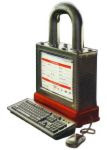 Today's world of technological advances and virtual everything - banking, bill paying, etc. - it's more important than ever to make sure we protect our personal data. In recent years, the Internet has become an appealing place for criminals to obtain identifying data, such as passwords or even banking information. In their haste to explore the exciting features of the Internet, many people respond to "spam" - unsolicited e-mail - that promises them some benefit but requests identifying data, without realizing that in many cases, the requester has no intention of keeping his promise. In some cases, criminals reportedly have used computer technology to obtain large amounts of personal data.
Today's world of technological advances and virtual everything - banking, bill paying, etc. - it's more important than ever to make sure we protect our personal data. In recent years, the Internet has become an appealing place for criminals to obtain identifying data, such as passwords or even banking information. In their haste to explore the exciting features of the Internet, many people respond to "spam" - unsolicited e-mail - that promises them some benefit but requests identifying data, without realizing that in many cases, the requester has no intention of keeping his promise. In some cases, criminals reportedly have used computer technology to obtain large amounts of personal data.  With enough identifying information about an individual, a criminal can take over that individual's identity to conduct a wide range of crimes: For example, false applications for loans and credit cards, fraudulent withdrawals from bank accounts, fraudulent use of telephone calling cards, or obtaining other goods or privileges which the criminal might be denied if he were to use his real name. If the criminal takes steps to ensure that bills for the falsely obtained credit cards, or bank statements showing the unauthorized withdrawals, are sent to an address other than the victim's, the victim may not become aware of what is happening until the criminal has already inflicted substantial damage on the victim's assets, credit, and reputation.
With enough identifying information about an individual, a criminal can take over that individual's identity to conduct a wide range of crimes: For example, false applications for loans and credit cards, fraudulent withdrawals from bank accounts, fraudulent use of telephone calling cards, or obtaining other goods or privileges which the criminal might be denied if he were to use his real name. If the criminal takes steps to ensure that bills for the falsely obtained credit cards, or bank statements showing the unauthorized withdrawals, are sent to an address other than the victim's, the victim may not become aware of what is happening until the criminal has already inflicted substantial damage on the victim's assets, credit, and reputation.To reduce or minimize the risk of becoming a victim of identity theft or fraud, there are some basic steps you can take. For starters, remember the word SCAM:
S: Be Stingy about giving out your personal information to others unless you have a reason to trust them, regardless of where you are.
C: Check your financial information regularly, and look for what should and shouldn't be there.
A: Ask periodically for a copy of your credit report.
M: Maintain careful records of your banking and financial accounts
S: Be Stingy about giving out your personal information to others unless you have a reason to trust them, regardless of where you are.
C: Check your financial information regularly, and look for what should and shouldn't be there.
A: Ask periodically for a copy of your credit report.
M: Maintain careful records of your banking and financial accounts
 This below is the 10 ways to safeguard our personal and financial data
This below is the 10 ways to safeguard our personal and financial data1. Take Stock. Know what personal information you have in your files and on yourcomputers. Never leave sensitive papers in a common area unattended.
2. Scale Down. Keep only what you need for your business. If you don't have alegitimate business need for information, don't collect it.
3. Lock It. Protect the information that you keep. Limit access to employees with alegitimate business need. Control who has a key, the number of keys and knowwhen information is being accessed.
4. Pitch it. Properly dispose of what you no longer need. If you collect applicationswith personal financial information, make sure the paperwork is unreadablebefore you dispose of it. Crosscutshredding is an effective way to preventidentity thieves from stealing it from your trash.
5. Email Restrictions. Regular email is not a secure method for sending sensitivedata. Never send personal financial information via Email.
6. Protect It. Use antivirusand antispywaresoftware, as well as a firewall, andupdate them all regularly. Also, use a passwordactivatedscreen saver to lockyour screen whenever you are not in front of it.
7. Use "Strong" Passwords. The longer the password, the better. Use passwordswith a mix of letters, numbers & characters and frequently change yourpassword. Do not use the same password for all of the various accounts youaccess with a password.
8. Limit Team Roles. Only allow certain employees to access sensitive personalfinancial information wherever it is. Manage the user permission of youremployees carefully on places like the Member Solutions or banking websites.
9. Make Sure Your Vendors are PCI Compliant. Any financial institution,software provider, merchant processor, or other company that you do businesswith should be taking steps to be PCI compliant. Any company or softwareapplication that contains cardholder data must comply.
10. Treat it Like it Was Your Own. Safeguard all personal financial information ofyour customers, employees or anyone else like is was your own personalinformation.
Even though financial institutions are required to maintain copies of your checks, debit transactions, and similar transactions for five years, you should retain your monthly statements and checks for at least one year, if not more. If you need to dispute a particular check or transaction, especially if they purport to bear your signatures, your original records will be more immediately accessible and useful to the institutions that you have contacted.
.jpg)

No comments:
Post a Comment